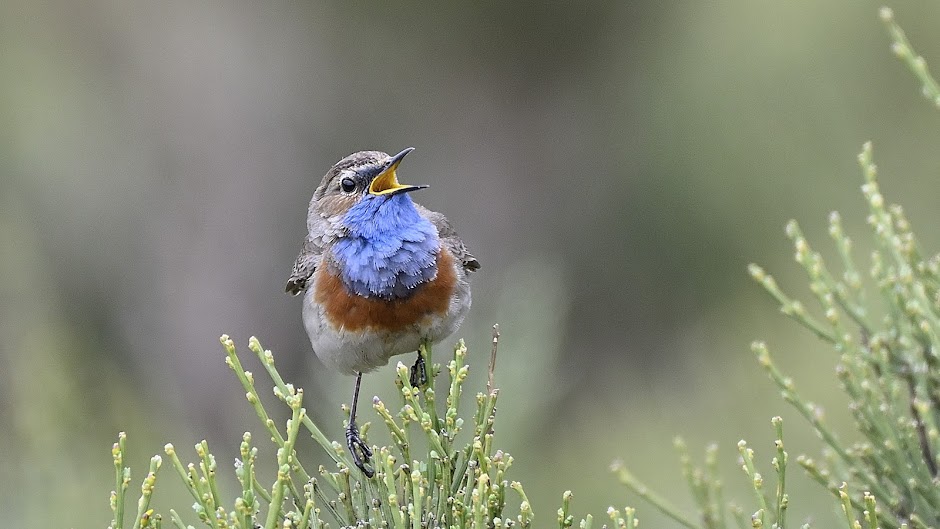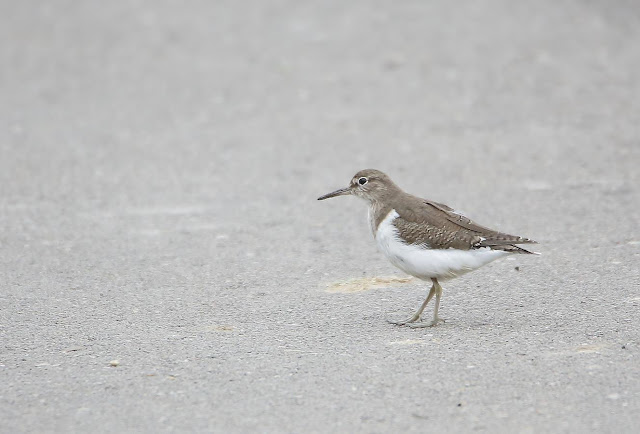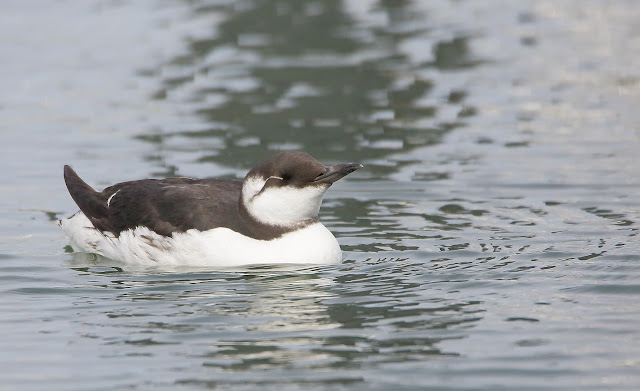En el siguiente enlace podéis ver nuestros viajes nacionales y extranjeros previstos para este año.
In the following link you can see our national and foreign trips planned for this year.
Hola de nuevo.
Hello again.
Esta semana os muestro algunas de las aves que vimos en un viaje de tres días al norte de España para ver aves que se ven pocas veces en otros lugares. Concretamente, decidimos acudir el primer día a Gijón y los dos siguientes a Santoña y sus alrededores.
This week I show you some of the Birds we saw on a three-day trip to northern Spain to see birds that are rarely seen in other places. Specifically, we decided to go on the first day to Gijón and the next two to Santoña and its surroundings.
Este año se estaban viendo en Gijón unas gaviotas groenlandesas (Larus glaucoides) y un gavión hiperboreo (Larus
hyperboreus) y en Santoña un arao común (Uria
Aalge) muy manso en el puerto de Santoña.
This year in Gijón ther were two Iceland Gull and a Glaucous Gull and in Santoña a Common Guillemot very tame in the Port of Santoña.
El tiempo fue bastante malo incluso un día amaneció todo nevado aunque el frío y la lluvia no estropearon el viaje.
The weather was pretty bad even one day dawned all snowy, although cold and rain did not spoil the trip.
Primer día: Asturias
First day: Asturias
Cuando íbamos al puerto de Gijón vimos cormorán moñudo (Phalacrocorax
aristotelis). En la foto un adulto.
When we were going to the port of Gijón we saw a European Shag. In the photo an adult.
Joven.
Juvenile.
Gavión Atlántico (Larus
marinus).
Great
black-backed Gull.
Y vimos una de las gaviotas groenlandesas (Larus
glaucoides).
And we saw one of the Greenland Gulls.
Y también el gavión hiperbóreo (Larus hyperboreus).
And also the Glaucous
Gull.
También disfrutamos viendo gaviotas cabecinegras (Larus melanocephalus).
We also enjoy watching Mediterranean
Gull.
Gaviota reidora (Chroicocephalus
ridibundus).
Black-headed
Gull.
Y otra especie que veo con poca frecuencia el correlimos oscuro (Calidris
maritima).
And other species that I rarely see the Purple Sandpiper.
Vuelvepiedras común (Arenaria
interpres).
Turnstone.
Vimos 3 camachuelos comunes (Pyrrhula
pyrrhula). Dos machos como este y una hembra que no pude fotografiar.
We saw 3 Common Bullfinches. Two males like this one and a female that I could not photograph.
Me encantan.
I love them.
Carbonero común (Parus
major).
Great Tit.
Tórtola turca (Streptopelia
decaocto).
Eurasian
Collared Dove.
Garza real (Ardea
cinerea).
Grey
Heron.
En el Parque de Isabel la Católica hay un pato mandarín (Aix galericulata) con el vuelo largo. Probablemente proveniente de un escape.
In the Isabel la Católica Park there is a Mandarin Duck with the long flight. Probably coming from an escape.
Pato joyuyo (Aix sponsa) este convenientemente amputado.
Wood Duck which is conveniently amputated.
Al igual que esta tercera belleza que se llama cerceta de Baikal (Anas formosa).
Like this third beauty called Baikal Teal.
También encuentran refugio en los estanques algunas cucharas comunes (Anas
clypeata).
Some Northern
Shovelers also find refuge in the ponds.
Agateador europeo (Certhia
brachydactyla).
Short-toed
Treecreeper.
Segundo y tercer días: Parque Natural de las Marismas de Santoña, Victoria y Joyel.
Second and third days: Natural Park of Las Marismas de Santoña, Victoria and Joyel.
Cópula de halcones peregrinos (Falco
peregrinus).
Mating Peregrine Falcons.
La hembra.
The famale.
Espátula común (Platalea
leucorodia) adulta.
Adult of Eurasian
Spoonbill.
Joven.
Juvenile.
Porrón moñudo (Aythya
fuligula).
Tufted
Duck.
Hembra.
Female.
Somormujo lavanco (Podiceps
cristatus).
Great
Crested Grebe.
Había bastantes barnacjas carinegras ( Branta bernicla).
Brent geese.
Este colimbo grande (Gavia immer) se comió una platija europea (platichthys flesus) bastante grande.
This Great
Northern Diver ate a rather large European Flounder.
Cormorán grande (Phalacrocorax
carbo).
Great Cormorant.
Y este otro se comió un pulpo (Octopus vulgaris).
And this one ate an Octopus.
Cormorán moñudo (Phalacrocorax
aristotelis) adulto.
Adult European Shag.
Zampullín cuellinegro (Podiceps
nigricollis).
Black-necked
Grebe.
Y este que se comió una buena aguja (Belone belone).
And this one who ate a good Garfish.
Este colimbo grande (Gavia immer) fue el que tuvimos más cerca.
This Great
Northern Diver was the closest we had.
Alca común (Alca
torda).
Razorbill.
Vimos varias lavanderas enlutadas (Motacilla
alba yarrelli).
We saw several Pied Wagtail.
Cercetas comunes (Anas
crecca).
Common
Teal.
De los limícolas vimos bastantes especies. Os digo las que vimos y luego os enseño las especies más en detalle.
We saw many species of Waders. Then I show you the species more in detail.
Los más abundantes eran los correlimos comunes (Calidris
alpina).
The most abundant were Dunlins.
Silbones europeos (Anas
penelope).
Eurasian
Wigeons.
Estornino pinto (Sturnus
vulgaris).
Common
Starling.
Vamos con algunos de los limícolas vistos.
Ostreros euroasiáticos (Haematopus
ostralegus).
Let us start with some of the Waders seen.
Eurasian
Oystercatcher.
Archibebe claro (Tringa
nebularia).
Greenshank.
En la izquierda un zarapito trinador (Numenius
phaeopus) y el otro un chorlito gris (Pluvialis
squatarola).
On the left a Whimbrel and the other is a Gray Plover.
Una visión más cercana de un chorlito gris (Pluvialis squatarola).
A closer view of a Gray Plover.
Zarapito real (Numenius
arquata).
Eurasian Curlew.
Delante del zarapito real (Numenius arquata) se ven tres individuos más claros que son correlimos tridáctilos (Calidris
alba) aunque hay otros tres más a mano izquierda.
In front of the Eurasian Curlew there are three lighter individuals that are Sanderlings although there are three others on the left.
Aguja colinegra (Limosa
limosa).
Black-tailed
Godwit.
En el centro de la foto hay dos agujas colipintas (Limosa
lapponica).
In the center of the photo there are two Bar-tailed
Godwit.
Andarríos chico (Actitis
hypoleucos).
Common
Sandpiper.
Charrán patinegro (Thalasseus
sandvicensis).
Sandwich
Tern.
Bisbita pratense (Anthus
pratensis).
Meadow
Pipit.
Gavión atlántico (Larus
marinus).
Great
black-backed Gull.
Focha común (Fulica
atra) con leucismo parcial.
Common Coot with partial leucism.
Macho de cuchara común (Anas
clypeata).
Male of Northern
Shoveler.
Macho de ánade friso (Anas
strepera).
Gadwall male.
Hembra.
Female.
Cisne vulgar (Cygnus
olor).
Mute Swan.
Zampullín común (Tachybaptus
ruficollis).
Little
Grebe.
Porrón europeo (Aythya
ferina) macho.
Male of Common
Pochard.
Hembra.
Female.
Macho de eider común (Somateria
mollissima).
Male of Common Eider.
Precioso pato.
Beautiful Duck.
Y para finalizar os muestro algunas fotos del arao común ( Uria
Aalge) que tan buenos ratos nos hizo pasar.
Y finalmente les muestro algunas fotos del Common Guilllemot de los buenos momentos que pasamos viéndolo.
Cuando andaba de pesca era una gozada ver como se sumergía.
When it was fishing was a joy to see it diving.
Y también cuando reposaba.
As well as when it was resting.
Hasta pronto.
Bye bye.













































































































No hay comentarios:
Publicar un comentario